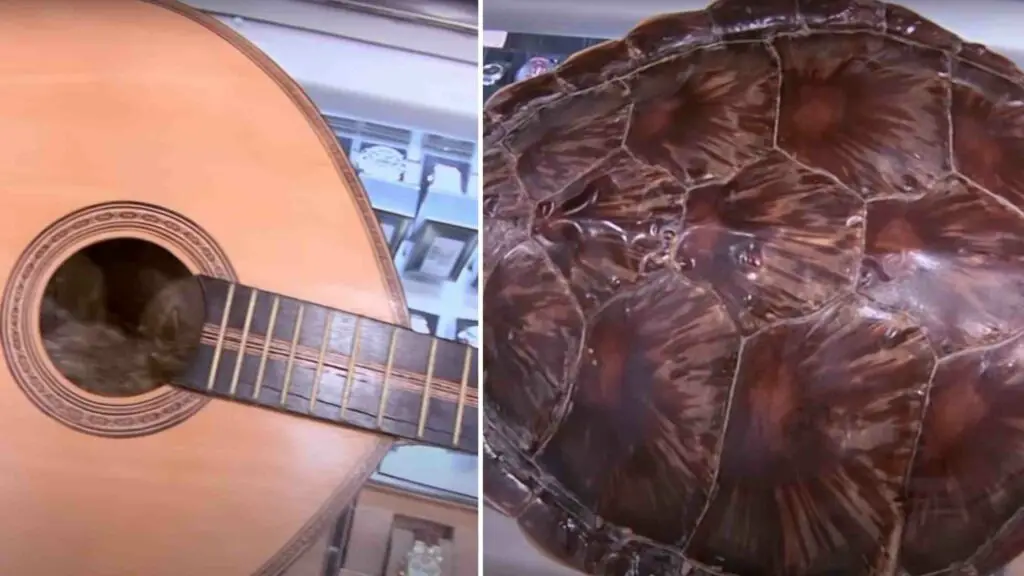If you’re a guitar enthusiast, you may be familiar with all the different kinds of guitar wood out there. However, there’s another material that has caused a stir in the guitar community: tortoise shell.
While tortoise shell has been used in guitar making since the early 1900s, it is now illegal due to the endangered status of the animals. Despite the ban, there are still vintage guitars and guitar picks made from tortoise shells in circulation.
So, what’s the truth about tortoise shell guitars? Are they legal? Are they safe to use? Is it ethical to use them? Let’s take a look at what you need to know.
What Are Tortoise or Turtle Shell Guitars?

Tortoise (turtle) shell guitars are musical instruments with a shell made from the carapace (the top part) of a tortoise. The shell is glued to the guitar’s body, and then the guitar is finished with a clear lacquer. This process gives the guitar a distinctive appearance that has made it popular in the past.
However, since 1977 trade of tortoiseshell items has been restricted by many governments. This means that buying or selling any tortoiseshell guitar is illegal, and you can face jail time along with a hefty fine if you’re found to own a tortoiseshell.
The History of Tortoise Shell Guitars
Tortoise shell guitars have a rich history that dates back to the 1800s. In the early days of guitar making, tortoise shell was a popular material for the construction of guitar picks and pickguards.
The material was prized for its durability, flexibility, and attractive appearance. However, as the demand for tortoise shell products grew, the population of sea turtles began to decline rapidly.
In the 1970s, the Convention on International Trade in Endangered Species of Wild Fauna and Flora (CITES) was established to regulate the trade of endangered species. This included the trade of tortoise shell products.
As a result, it became illegal to manufacture and sell tortoise shell products, including guitar picks and pickguards, made from turtles that were harvested after the CITES regulations were put in place.
Today, the use of tortoise shell in guitar-making is strictly prohibited. Guitar makers have turned to alternative materials such as celluloid and other plastics to create guitar picks and pickguards that mimic the look and feel of tortoise shell.
While these materials may not have the same history and prestige as tortoise shell, they are legal and readily available.
The Controversy Surrounding Tortoise Shell Guitars
Environmental Concerns
Tortoise shell guitars have been a source of controversy due to the environmental impact of using tortoise shells. The Hawksbill turtle is the primary source of tortoise shell, which is used to create guitar pickguards, accessories, and other musical instruments. Unfortunately, this species is currently listed as critically endangered by the International Union for Conservation of Nature (IUCN).
Legal Issues
In addition to environmental concerns, tortoise shell guitars have also been a source of legal controversy.
The use of tortoise shell in guitar manufacturing has been banned in many countries, including the United States. The Lacey Act, which is a US federal law, prohibits the import, export, sale, and purchase of products made from endangered species, including tortoise shell.
Manufacturers and sellers of tortoise shell guitars may face legal consequences for violating these laws.
So, it is important for guitar buyers to be aware of the legal issues surrounding tortoise shell guitars and to ensure that the guitar they are purchasing is legal and ethically sourced.
Alternatives to Tortoise Shell Guitars
As the controversy surrounding the use of tortoise shells in guitar picks and other guitar-related products continues to grow, more and more musicians and manufacturers are seeking out alternative materials that are sustainable and ethical. here are some popular options for guitar picks that are both eco-friendly and effective for playing.
Tortex Picks: A Suitable Substitute for Tortoise Shell
Tortex is a type of nylon material that was created to replace tortoiseshell guitar picks. It has been widely accepted as a suitable substitute due to its durability, flexibility, and versatility. Tortex picks come in a variety of thicknesses and shapes, so you can find the perfect one for your playing style. They are also more affordable than tortoise shell picks, making them a great option for musicians on a budget.
Ultem Picks: Durable and Bright-Toned
Ultem is a high-performance plastic material that is commonly used in aerospace and medical applications. It is also an excellent alternative to tortoise shell guitar picks, as it is known for its durability and bright tone. Ultem picks are ideal for players who want a pick that can withstand heavy use and produce a clear, bright sound.
Casein Picks: Warm and Vintage-Toned
Casein is a protein-based material that was commonly used in guitar picks before plastic became popular. It is an eco-friendly alternative to tortoise shell, as it is made from natural materials. Casein picks are known for their warm, vintage tone, and are popular among jazz and blues guitarists. They are also more affordable than tortoise shell picks.
Celluloid Picks: Bright-Toned and Flexible
Celluloid is a type of plastic that was commonly used in guitar picks in the mid-20th century. It is another eco-friendly alternative to tortoise shell, and is known for its bright tone and flexibility. Celluloid picks come in a variety of colors and thicknesses, so you can find the perfect one for your playing style. They are also more affordable than tortoise shell picks.
Appearance on Pawn Stars
A guitar made from a tortoise shell appeared in Season 7 of Pawn Stars when a man named Jon brought it to the shop to see if he could legally sell it.
Rick Harrison, the owner of the shop, was impressed by the guitar’s unique appearance but was unable to purchase it due to its illegal status.
However, he referred Jon to another pawnshop owner who might have been able to help him. Here is the full video of the episode.
Conclusion
After researching the topic of tortoise shell guitars, it is clear that owning one of these guitars is a controversial issue. While they may be rare and valuable finds, it is important to consider the legal status of owning one before making a purchase.
It is also essential to note that tortoise shell guitars are made from endangered species of turtles , which can be damaging to their population. For this reason, it is important to consider more sustainable and ethical alternatives such as Tortex, Ultem, Casein, and Celluloid guitar picks.
However, it is still possible to find tortoise shell guitars for sale in some places. If you are considering purchasing a tortoise shell guitar, it is crucial to do your research and ensure that the guitar was made before the late 1970s and that it was legally obtained.
Ultimately, as fellow musicians, we must stay informed and make responsible choices to protect endangered species and preserve the beauty of music for future generations.




